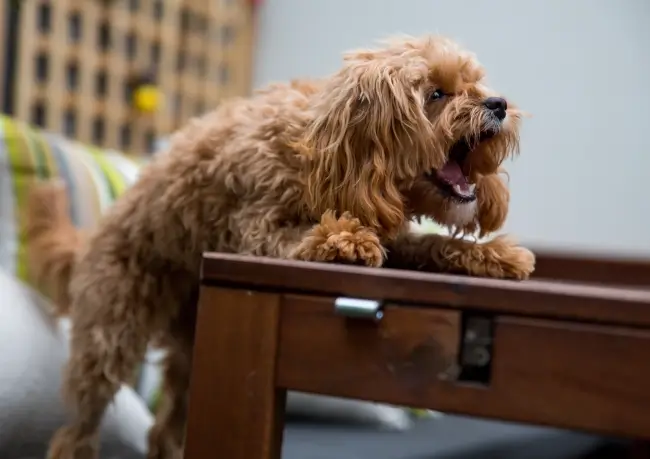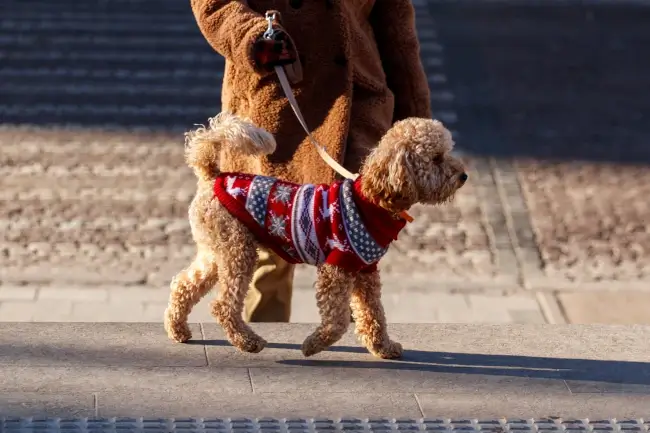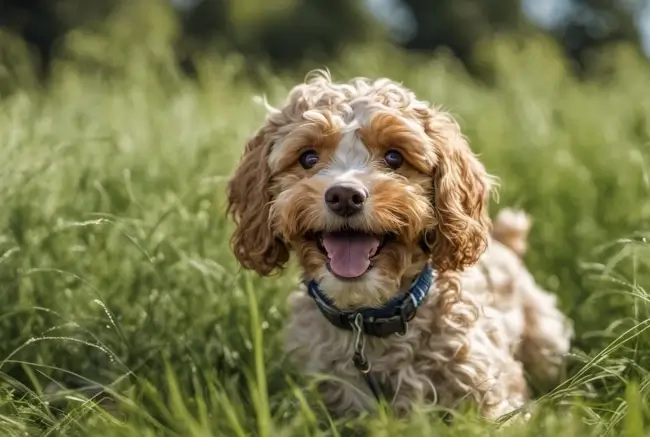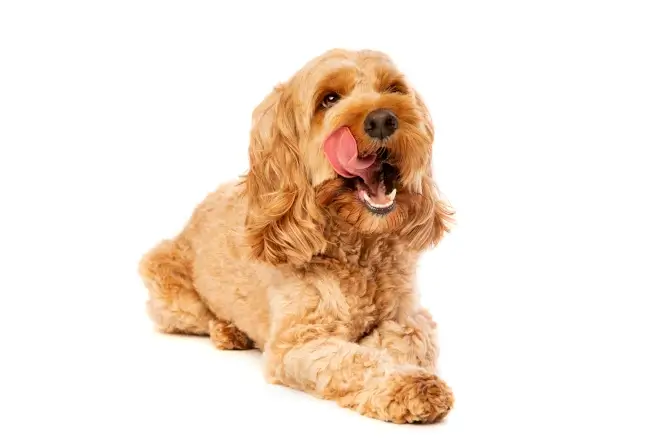Are Cavapoos Aggressive?

When considering a Cavapoo, an important question to ask is, “Are Cavapoos aggressive?”
These charming mix breeds, known for their affectionate nature and intelligence, typically exhibit low levels of aggression.
However, like any breed, their temperament can be shaped by various factors, including training, socialization, and individual personality.
Temperament of Cavapoos
Cavapoos are the epitome of companionship; their friendly and social nature makes every day a little brighter.
They’re not just dogs; they’re heart-warmers, tail-waggers, and your next best friend rolled into one furry package.
- Imagine a dog that showers you with affection after a long day. That’s a Cavapoo for you—always there with a cuddle to lift your spirits.
- Their love isn’t just for you; they spread joy to the whole family, kids included!
- Do you have other pets? No problem. These dogs are the peacekeepers of the pet world, getting along with everyone, from your old cat to your energetic new hamster.
- Training? A breeze with these clever canines. Cavapoos thrive on praise and are eager to learn—sit, stay, fetch, you name it, they can master it.
- Whether you’re in a cozy apartment or a sprawling house with a yard, Cavapoos adapt to your lifestyle. City dwellers or countryside residents, they fit right in.
- Looking for a jogging partner or a couch companion? These dogs match your pace, always ready for adventure but equally content with a lazy afternoon.
- In every Cavapoo, there’s a perfect balance—affectionate, adaptable, and just plain fun.
- They’re not just pets; they’re family.
Ready to meet your match in a Cavapoo?
Cavalier King Charles Spaniel Temperament
Affectionate and friendly, these pups thrive on social interaction.
Imagine a dog that fits perfectly into family life, whether it’s a bustling household or a cozy apartment for one.
Gentle and patient, Cavaliers are the heartwarmers of the canine world, especially with kids.
Training is a breeze. Their intelligence shines through with every new trick learned with a wagging tail.
Eager to please, they respond to positive vibes like they’re made for it.
And their therapeutic charm? Unmatched.
They’re the unsung heroes in hospitals, spreading comfort as only they can.
Miniature Poodle Temperament
Playful and outgoing, these little dynamos light up any room.
They’re the social butterflies of the dog world, always ready for a playdate or a cuddle.
Adaptable? Absolutely. They fit into family life like a missing puzzle piece.
Kids and Mini Poodles? A match made in heaven, especially when they grow up together.
But there’s more – their alertness is like a built-in home security system.
Small in size, yes, but with the heart and spirit of a giant.
Trainable beyond belief, they’re the valedictorians of doggy obedience and agility.
They crave mental challenges and thrive on regular jogs or games.
Loyalty and affection are their middle names, creating an unbreakable bond with their humans.
In every Miniature Poodle, a delightful companion is waiting to become part of your life story.
Combining the Cavalier and the Poodle results in the Cavapoo, the most amazing and perfect family pet.

What May Cause Cavapoos to Be Aggressive?
When your dog growls instead of wagging its tail, it’s a sign that something is amiss.
Aggression can develop, often tracing back to their early life experiences.
Proper socialization is crucial; without it, a Cavapoo may struggle to interact peacefully with others.
Unsocialized dogs may exhibit fear or defensive behavior that can be mistaken for aggression.
Their history plays a role too; dogs from difficult backgrounds may take longer to trust.
Sometimes, aggression is a dog’s way of expressing discomfort or pain.
It’s the responsibility of the owner to recognize these behaviors and address their needs.
Consistent love, care, and attention can ensure your Cavapoo remains a loving companion.
Cavapoo Pain Aggression
Cavapoos, with their lineage of Cavalier King Charles Spaniel and Poodle, are typically affectionate pets.
However, discomfort can cause a change in their behavior.
When in pain, a dog may become aggressive as a natural response to protect itself.
Signs of discomfort may include growling, snapping, or an unusual bite.
These behaviors are indicators that your dog may be suffering.
Owners should carefully observe their Cavapoo for any signs of distress.
Addressing pain may involve treatments such as medications, physical therapy, or lifestyle adjustments.
In certain cases, consulting with a veterinarian or a professional trainer may be necessary.
Prompt care and understanding can help alleviate your dog’s discomfort and return them to their gentle state.
Cavapoo Hormone Aggression
Cavapoos are typically known for their gentle and affectionate nature.
However, as male dogs approach adolescence, around 6 to 8 months, their behavior may change.
This period is marked by an increase in testosterone, which can lead to hormone-driven aggression.
Behaviors such as growling, snapping, and biting may become more apparent during this time.
These actions are not indicative of poor behavior but are related to natural changes in their development.
All dog breeds can exhibit these hormonal changes, not just Cavapoos.
Fortunately, this period of heightened aggression is often temporary.
Appropriate training, socialization, and neutering when advised by a vet can help mitigate these behaviors.
For owners of Cavapoos, patience and proper guidance are key during this developmental stage.

Cavapoo Social Aggression
Cavapoos are often the life of the dog park, known for their sociable nature.
Yet, they can sometimes display social aggression.
This behavior isn’t unique to Cavapoos; it’s seen across various breeds.
During social encounters, they may express discomfort through growling or snapping.
Not all dogs exhibit these behaviors; much depends on their upbringing and genetics.
Proper socialization from a young age is crucial for developing their social skills.
Early exposure to different scenarios is key to fostering their amiable qualities.
Should signs of social aggression arise, professional guidance is recommended.
A skilled trainer or behaviorist can provide strategies to manage and correct this behavior.
Cavapoo Fear Aggression
Cavapoos, with their charming looks and affectionate demeanor, can also experience fear.
This fear can manifest as aggression, a natural response when they feel threatened.
Growling, barking, and sometimes biting are signs they’re feeling distressed.
These reactions stem from fear, not hostility, often triggered by loud noises or unfamiliar situations.
Immediate environments like tight spaces can also induce anxiety.
Addressing fear early on is crucial to prevent it from becoming ingrained.
Positive reinforcement training is essential for building their confidence.
Gradual exposure to their fears, known as desensitization, can also be beneficial.
Creating a safe and secure environment is key to helping them feel at ease.
For persistent issues, seeking help from a professional trainer or behaviorist is advisable.
With consistent support, a Cavapoo’s fear can be eased, returning them to their joyful selves.
Cavapoo Possessive Aggression
Cavapoos, with their Cavalier and Poodle heritage, can sometimes guard their belongings too zealously.
Possessive aggression is when they guard objects with growls or snaps.
Items like toys, treats, or even an owner’s attention can trigger this behavior.
This behavior requires attention and training, not just dismissal as play.
Early training can prevent possessive tendencies from taking hold.
Introducing them to a variety of experiences helps them learn to share.
Teaching commands such as “leave it” or “drop it” is crucial for managing these moments.
Consistency in training and patience in practice are vital.
For persistent guarding behaviors, professional help may be necessary.
With the right training and care, a Cavapoo can learn the joy of sharing.

Cavapoo Protective Aggression
Cavapoos, a delightful mix of Cavalier King Charles Spaniel and Poodle, are often the embodiment of affection.
Yet, they may exhibit protective instincts, standing guard over their owners.
This protective aggression is an instinctual response to perceived threats.
They may bark or growl, signaling to others to keep their distance when they feel protective.
Understanding and managing this behavior is crucial for a peaceful household.
Socializing them from a young age helps them to understand that not all strangers are threats.
As they gain confidence in their environment, their need to protect may diminish.
Teaching them commands like “sit” and “stay” helps manage their protective impulses.
If protective behaviors become too pronounced, seeking a professional’s help is wise.
Proper training can channel a Cavapoo’s protective instincts into a more balanced temperament.
Cavapoo Puppy Aggression
Cavapoo puppies, with their cuddles and kisses, are usually little lovebugs.
But sometimes, a growl or a nip can surface – signs of aggression in the making.
It’s a language, their way of saying, “I’m scared,” or “I don’t like this.”
Proper socialization is the golden ticket – it teaches them the world is a friendly place.
Without it, fear and anxiety can whisper to them, turning to growls for protection.
Bad experiences? Harsh scoldings? These can leave a mark, turning fear into snarls.
Invest time in their world education – introduce them to life’s variety with a smile.
Use treats and praise to build the behaviors you love, turning potential growls into wags.
And if the aggression doesn’t fade, seek wisdom from those who speak ‘dog’ fluently – trainers and behaviorists.
With love, patience, and the right guidance, your Cavapoo pup can grow into the gentle companion you know they can be.
What to do if your Cavapoo is Aggressive
If your Cavapoo shows signs of aggression, it’s crucial to act swiftly.
Understanding the cause is the first step – fear, possessiveness, or insufficient socialization are common culprits.
Once you pinpoint the reason, you can begin to address it with appropriate behavior modification strategies.
Seeking the assistance of a professional dog trainer or behaviorist is often a wise decision.
They can offer specialized advice and strategies tailored to your dog’s needs.
While addressing these behaviors, it may be necessary to avoid situations that could trigger aggression.
Training should be based on positive reinforcement, rewarding desired behaviors to gradually reduce aggressive tendencies.
Consistency and patience are essential in this process.
Above all, ensure the safety of all individuals and animals involved, and do not hesitate to seek professional help if the aggression persists.
Prevent Aggression in Cavapoos
Cavapoos are known for their amiable and social nature, yet they are not exempt from exhibiting aggressive behaviors if their training and socialization are neglected.
To avert such tendencies, it’s imperative to establish a leadership role early on, setting a foundation of consistent training coupled with clear guidelines and limitations.
Employing positive reinforcement is beneficial in promoting desirable behavior and mitigating any aggressive impulses.
It’s vital to introduce dogs to a variety of people, fellow animals, and diverse environments while they’re young.
Such exposure is instrumental in nurturing a composed and self-assured temperament.
Engaging them in regular physical activity and mental challenges is equally important to direct their energy constructively.
Should signs of aggression emerge, it’s critical to consult a professional trainer or behaviorist for expert advice and intervention.
Adhering to these practices will help maintain the inherent friendly and obedient character of your Cavapoo.

Training and Mental Stimulation
Engaging a Cavapoo’s body and mind is not just beneficial; it’s essential for their well-being.
Physical activity keeps these pups fit, triggering endorphins that boost their mood.
Mental engagement is just as crucial, from puzzle toys to new tricks that challenge their intellect.
Cavapoos thrive on learning, whether it’s mastering commands or exploring new environments.
Their memory and problem-solving skills sharpen with each playful session.
And as they grow, these activities help ward off cognitive decline, keeping their minds nimble.
Creativity in play leads to a well-rounded, happy Cavapoo.
Blend daily exercise and brain games for content, balanced Cavapoo life.
Neutering or Spaying Your Cavapoo
Deciding to neuter or spay your Cavapoo is a major step for any pet parent.
This procedure means your dog won’t have puppies, impacting more than just your household.
It’s a move against overpopulation, a stand for those countless shelter dogs waiting for homes.
Health and behavior – they both get a boost post-surgery.
Risks of certain cancers drop, and the urge to mark territory or wander fades away.
A calmer Cavapoo emerges one that’s even more of a joy to train.
Neutering or spaying isn’t just an operation; it’s a pathway to a contented Cavapoo life.
Wrapping Up
In summary, Cavapoos are generally not aggressive and are well-loved for their friendly and sociable demeanor.
Proper training and early socialization play crucial roles in nurturing their naturally gentle temperament.
By understanding and meeting their needs, owners can ensure their Cavapoo remains a loving and well-behaved companion.






